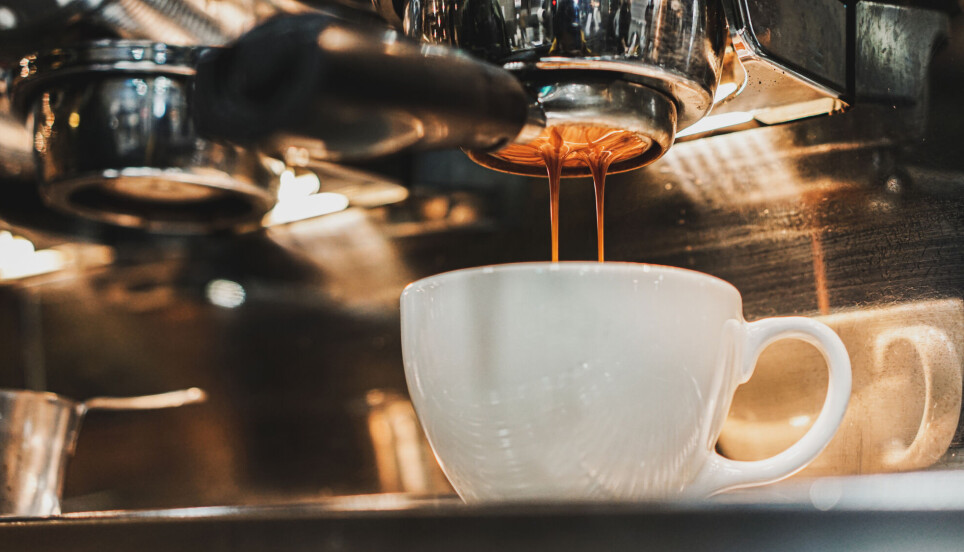THIS ARTICLE/PRESS RELEASE IS PAID FOR AND PRESENTED BY UiT The Arctic University of Norway - read more

Too much espresso increases your cholesterol levels, especially if you are a man
Results from the latest Tromsø survey indicate that the method of brewing coffee changes the way coffee affects your cholesterol levels. Which biological sex you are also matters.
Natural chemicals in coffee - diterpenes, cafestol and kahweol - increase the cholesterol levels in your blood. Therefore, it is helpful to know which types of coffee affect cholesterol levels the most. Previous research has shown that how you brew your coffee determines how much the cholesterol levels are affected.
UiT researchers have compared drinking espressos, to drinking other types of coffee brews. More than 20,000 people, aged 40 or older, took part in the study on coffee and cholesterol.
The results are a little surprising, because it actually matters whether you are a man or a woman.

"We found that drinking 3-5 cups of espresso daily led to increased cholesterol levels, especially for men," says Maja-Lisa Løchen, professor of preventitive medicine at the Arctic University of Norway (UiT).
Espresso coffees also include cappuccinos, lattes and coffee capsules.
Løchen conducted the coffee research together with medicine student Åsne Lirhus Svatun and colleagues. Svatun has worked on this project while studying to become a doctor.
Gender differences and number of cups
Women in the study averaged just under four cups a day, while men drank close to five. Compared with those who did not drink any coffee, female coffee drinkers had 0.09 mmol/l higher cholesterol levels in the blood, while the cholesterol levels increased by 0.16 mmol/l in men. Male coffee drinkers had nearly twice as high levels as the women.
A daily figure of 6 or more cups of boiled/plunger coffee was also associated with increased cholesterol, and to a similar degree in both sexes: 0.30 mmol/l higher for women and 0.23 mmol/l for men. While 6 or more cups of filtered coffee every day increased the cholesterol by 0.11 mmol/l for women, but not for men, compared to those who did not drink filtered coffee.
While instant coffee led to an increase in cholesterol in both sexes, this did not increase with the number of cups, compared to those who completely avoided instant coffee.
"There are currently no obvious explanations for the gender difference in cholesterol response to coffee drinking," says Løchen.
However, the findings show that drinking espresso was associated with the largest gender difference in cholesterol levels; while boiled/plunger coffee was associated with the smallest difference.
More than 20,000 coffee drinkers included in the study
Espresso is a coffee drink that is made by squeezing hot water through very finely ground coffee under high pressure.
"Espresso is made without a filter, so naturally there are more of the chemicals in this type of coffee, than in coffee made with a filter," says Løchen.
The UiT researchers received data from 21,083 participants (11,074 women; 10,009 men) who responded to the seventh round of the large population study, the Tromsø survey, in 2015–16. The long-term population survey started in 1974 and involves residents of the city of Tromsø.
Participants were asked how many cups of coffee they drank daily - none, 1-2 cups; 3–5; and 6 or more - and which type of coffee they drank - filtered; plunger; espresso from coffee machines/coffee capsules, etc; or instant coffee. Blood samples were drawn, and height and weight were measured. Participants also had to provide information on potential factors that could affect the results: diet and lifestyle, including smoking, alcohol intake and physical activity; level of education; and whether type 2 diabetes had been diagnosed.
She says the results provide important information to the population.
"If you already have high cholesterol levels or have had a heart attack, then filter coffee or instant coffee is preferable. It affects your cholesterol the least," Løchen says. "Coffee is the most widely used stimulant worldwide. Due to this high coffee consumption, even small health effects can have significant health consequences."
Cholesterol is a fat that is found in all our cells and in the blood. It is an important building block for the body and is transported trhough the blood. But sometimes there can be too much of this in the blood, it can accumulate and lead to, among other things, heart disease.
However, Løchen emphasises that the most important thing for healthy cholesterol levels is to eat healthy, be active, and quit smoking.
"We should avoid too much 'barn fat', says the professor who has been researching heart health for years. By that she means that we should reduce the amount of red meat, especially processed meat such as sausages and minced meat, and generally follow the dietary advice of the health authorities.
Positive coffee effects
The researchers point out that there was no standardised cup size used in their study.
"Norwegians tend to drink from larger espresso cups than Italians, for instance," says Løchen.
She therefore believes that new studies should take this into account.
Different types of espresso - from coffee machines, capsules or an espresso pot - probably also contain different levels of the most important naturally occurring chemicals.
"Interestingly, coffee contains more than a thousand different chemicals. The intake of each compound also depends on the diversity of coffee species, degree of roasting, type of brewing method and serving size," she explains.
The researcher says that experimental studies also show that cafestol and kahweol, in addition to increasing total cholesterol, have anti-inflammatory effects, protect the liver and reduce the risk of cancer and diabetes.
"This shows how coffee contains compounds that can lead to several mechanisms working simultaneously," says Løchen.

The joys of coffee
Maja-Lisa Løchen and Åsne Lirhus Svatun are keen to point out that they do not advise against drinking coffee based on their results, not even espresso.
"Coffee gives us so much joy. That cup of coffee in the morning is so important. If you're at your summer cabin and there's no coffee there... I mean, it's a catastrophe!" Løchen says.
So how much coffee is good for you?
"If you drink 1-2 cups of espresso a day, you do not have to worry, but if you drink a lot of coffee every day, then you may want to switch filter coffee," the professor says.
This is especially important if you already have high levels of cholesterol.
"We want people receive this information so that they can make conscious choices," Løchen concludes.
Reference:
Svatun et al. Association between espresso coffee and serum total cholesterol: the Tromsø Study 2015-2016, Open Heart, vol. 9, 2022. DOI: 10.1136/openhrt-2021-001946

This article/press release is paid for and presented by UiT The Arctic University of Norway
This content is created by UiT's communication staff, who use this platform to communicate science and share results from research with the public. UiT The Arctic University of Norway is one of more than 80 owners of ScienceNorway.no. Read more here.
See more content from UiT:
-
AI can help detect heart diseases more quickly
-
Why does Norway need its own AI law?
-
Researchers reveal a fascinating catch from the depths of the sea
-
How can we protect newborn babies from dangerous germs?
-
This is how AI can contribute to faster treatment of lung cancer
-
Newly identified bacterium named after the Northern Lights is resistant to antibiotics




































